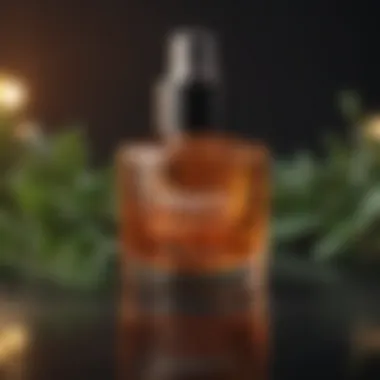Effective Ways to Eliminate Acne Scars: Expert Advice Revealed


Insider Beauty Tips
Acne scars can be a persistent concern for many individuals, affecting both appearance and self-confidence. Finding effective ways to eliminate these scars is crucial for achieving clear and smooth skin. Whether through natural remedies or professional treatments, exploring various methods can provide valuable insight into addressing this skincare issue. Understanding the different options available is essential for making informed decisions about skincare routines.
Product Reviews
When considering skincare products for tackling acne scars, it is important to seek out formulations that target specific skin concerns. Products containing ingredients like retinol, vitamin C, or hyaluronic acid are known for their skin-renewing properties and can play a significant role in reducing the appearance of scars over time. Choosing products tailored to individual skin types and concerns is key to achieving optimal results in scar treatment.
Makeup Trends
While makeup can help conceal acne scars temporarily, staying informed about the latest trends in makeup application is essential for creating a flawless finish. Techniques like color correcting and strategic concealer application can significantly minimize the visibility of scars, providing a boost in confidence for those dealing with skin imperfections. Keeping abreast of seasonal makeup looks and celebrity beauty inspirations can offer unique ideas for incorporating makeup into a scar-minimizing routine.
Beauty Industry News
Stay updated on the latest launches in skincare products that target acne scars, as advancements in beauty technologies continue to offer innovative solutions. Collaborations between brands often lead to the development of specialized products designed to address specific skincare concerns, including scar treatment. Following beauty events and product unveilings provides valuable information on up-and-coming products and treatments that may revolutionize scar care routines.
Understanding Acne Scars
Acne scars are a common skin concern that can have a significant impact on an individual's confidence and overall quality of life. Understanding the various types of acne scars, their causes, and how to prevent them is crucial in addressing this issue effectively. By delving into the nuances of acne scarring, individuals can make informed decisions about their skincare routine and treatment options, leading to clearer and smoother skin.
Types of Acne Scars
Atrophic Scars
Atrophic scars are characterized by a loss of skin tissue, resulting in depressions or pits on the skin's surface. These scars form when the skin is unable to regenerate tissue effectively after acne lesions have healed. While atrophic scars can be challenging to treat, various cosmetic procedures, such as microneedling and laser therapy, can help improve their appearance.
Hypertrophic Scars
Hypertrophic scars are raised scars that develop when the body produces excess collagen during the healing process. Unlike keloid scars, which extend beyond the original wound site, hypertrophic scars remain confined to the area of the initial injury. Treatment options for hypertrophic scars may include corticosteroid injections, silicone gel sheets, or laser therapy.
Keloid Scars
Keloid scars are characterized by their raised, lumpy appearance and can extend beyond the borders of the original wound. These scars result from an overproduction of collagen during the healing process, leading to their raised texture. While keloid scars are more common in individuals with darker skin tones, they can occur in anyone. Treatment for keloid scars may involve corticosteroid injections, cryotherapy, or surgical excision.
Causes of Acne Scarring
Inflammation
Inflammation plays a key role in the development of acne scars, as it can damage the skin's collagen and elastin fibers. When the skin is inflamed, the body produces enzymes that break down collagen, leading to the formation of scars. By addressing inflammation through proper skincare and anti-inflammatory treatments, individuals can reduce the risk of scarring.
Collagen Damage
Collagen damage is a critical factor in the formation of acne scars, as collagen is essential for skin healing and regeneration. When acne lesions penetrate deep into the skin, they can disrupt the normal collagen production process, resulting in atrophic or hypertrophic scarring. Protecting the skin's collagen matrix through gentle skincare and collagen-boosting treatments can help prevent scarring.
Delayed Healing
Delayed healing of acne lesions can contribute to the development of scars, as prolonged inflammation and tissue damage increase the risk of collagen depletion. Factors such as picking or squeezing pimples, inadequate wound care, and environmental stressors can all delay the skin's healing process, leading to persistent scars. By promoting prompt healing through proper wound care and skin support, individuals can minimize the risk of scarring.


Preventing Acne Scars
Proper Skincare
Proper skincare practices are essential for preventing acne scars, as a healthy skin barrier is better equipped to heal and regenerate efficiently. A consistent skincare routine that includes gentle cleansing, exfoliation, hydration, and sun protection can help maintain skin health and reduce the risk of scarring. Using non-comedogenic products and avoiding harsh irritants can also support skin regeneration and reduce inflammation, promoting smoother skin texture.
Avoiding Squeezing Pimples
One of the most common causes of acne scarring is the habit of squeezing or picking at pimples. This can cause further inflammation, damage to the skin's collagen, and potential infection, all of which increase the risk of scarring. By refraining from touching or manipulating acne lesions and seeking professional extraction when needed, individuals can prevent the development of permanent scars.
Early Treatment
Early intervention is key to preventing acne scars, as prompt treatment of active acne lesions can reduce inflammation, promote faster healing, and minimize tissue damage. Consulting with a dermatologist at the first sign of acne can ensure appropriate treatment options are implemented, such as topical medications, oral medications, or in-office procedures. By addressing acne early on, individuals can mitigate the risk of scarring and maintain healthy skin.
Natural Remedies for Acne Scars
In the realm of skincare, the utilization of natural remedies for acne scars takes center stage in this comprehensive guide. These remedies offer a holistic approach to skincare, harnessing the power of nature to combat and eliminate persistent acne scars. Natural remedies are gaining popularity due to their gentle yet effective properties that cater to individuals seeking safe and non-invasive solutions for their skin concerns. Within this article, the focus on natural remedies reflects a shift towards embracing organic and sustainable practices in skincare routines.
Lemon Juice
Benefits
Delving into the benefits of using lemon juice as a natural remedy for acne scars reveals its potent properties that contribute to skin rejuvenation and scar reduction. The high acidic content in lemon juice aids in exfoliating the skin, promoting the shedding of scarred layers and encouraging cell turnover. This natural exfoliation process can help fade acne scars over time, revealing a smoother complexion. The brightening effect of lemon juice also assists in reducing hyperpigmentation associated with acne scars, resulting in a more even skin tone. While lemon juice shows promise in treating acne scars, its potential drawbacks include skin sensitivity reactions in some individuals, necessitating a patch test before widespread application.
Usage
When considering the usage of lemon juice for acne scars, it is essential to dilute the juice with water to prevent irritation, as its high acidity can be harsh on the skin. Incorporating lemon juice into a DIY face mask or spot treatment allows for targeted application on areas affected by acne scars, maximizing its efficacy. Consistent and cautious application of lemon juice can yield gradual improvements in the appearance of acne scars, but it is crucial to complement this treatment with sun protection due to the photosensitizing nature of citrus fruits.
Aloe Vera
Healing Properties
Aloe vera emerges as a notable natural remedy for acne scars, attributed to its exceptional healing properties that nurture damaged skin and promote regeneration. The cooling and anti-inflammatory qualities of aloe vera soothe irritated skin and reduce redness, providing relief to those dealing with inflamed acne scars. Moreover, aloe vera's moisturizing effects help hydrate the skin, enhancing overall skin health and resilience. Its healing properties make aloe vera a preferred choice for individuals seeking a gentle yet effective solution for addressing acne scars without causing excessive dryness or irritation.
Application Methods
Exploring the application methods of aloe vera unveils its versatility in skincare routines. Directly applying aloe vera gel extracted from the plant or utilizing skincare products containing aloe vera can deliver beneficial results for acne scars. Regularly incorporating aloe vera into one's skincare regimen through masks, serums, or moisturizers allows for consistent treatment of acne scars while nourishing the skin. The non-comedogenic nature of aloe vera makes it suitable for all skin types, ensuring minimal risk of clogged pores or aggravated acne, underscoring its versatility and efficacy in skincare routines.
Rosehip Seed Oil
Regenerative Effects
Rosehip seed oil emerges as a potent remedy for acne scars due to its regenerative effects on the skin, promoting cell renewal and collagen production. Rich in essential fatty acids and antioxidants, rosehip seed oil aids in repairing damaged skin tissue and fading scars over time. Its regenerative properties contribute to skin rejuvenation, enhancing the overall texture and tone of the skin. The nourishing and reparative qualities of rosehip seed oil position it as a formidable contender in addressing acne scars effectively and naturally.
Application
When considering the application of rosehip seed oil for acne scars, incorporating it into a daily skincare routine can yield significant benefits for scar reduction and skin healing. Gently massaging a few drops of rosehip seed oil onto cleansed skin allows for optimal absorption and penetration, targeting acne scars at a cellular level. The non-greasy texture of rosehip seed oil enables quick absorption without leaving a residue, making it suitable for daytime and nighttime use. Regular application of rosehip seed oil can result in visible improvements in the appearance of acne scars, showcasing its efficacy in promoting skin regeneration and rejuvenation.
Medical Treatments for Acne Scars


When exploring the realm of tackling acne scars, delving into medical treatments unveils a realm of possibilities in achieving clear and rejuvenated skin. The significance of medical treatments for acne scars cannot be understated, offering targeted solutions that go beyond surface-level remedies. These treatments present a structured approach towards addressing persistent acne scars, providing lasting results and a renewed skin complexion. By opting for medical treatments, individuals can benefit from specialized procedures tailored to their specific scar types and skin conditions, ensuring a personalized and effective approach to scar removal.
Chemical Peels
Procedure
Chemical peels represent a cornerstone in the realm of acne scar treatment due to their exfoliating properties and ability to promote skin regeneration. The procedure involves the application of a chemical solution to the skin, which induces controlled peeling of the outer layers, revealing smoother, healthier skin underneath. This process stimulates collagen production, leading to improved skin texture and reduced appearance of scars. One of the key characteristics of chemical peels is their versatility, as they can be customized in terms of strength and depth based on individual needs and scar severity. While chemical peels offer significant benefits in enhancing skin tone and diminishing scars, potential drawbacks such as post-treatment sensitivity and redness should be considered in the decision-making process.
Results
As a result-oriented treatment, chemical peels demonstrate significant improvements in skin texture, tone, and overall appearance. The post-peel phase reveals rejuvenated skin with reduced scarring, improved clarity, and a more youthful complexion. The key characteristic of chemical peel results lies in their gradual but noticeable transformation of the skin, making them a popular choice for individuals seeking long-term scar reduction benefits. While the unique feature of chemical peels is their ability to target deep-seated scars and stimulate collagen synthesis, potential disadvantages include temporary skin flaking and sun sensitivity post-treatment.
Microneedling
Benefits
Microneedling emerges as a promising solution for acne scars, harnessing the benefits of controlled skin injury to trigger collagen and elastin production. The key characteristic of microneedling lies in its ability to initiate the skin's natural healing response, leading to scar repair and regeneration. This minimally invasive procedure offers significant benefits in scar reduction, skin firmness improvement, and overall texture enhancement. While microneedling stands out for its compatibility with various skin types and scar depths, it is essential to weigh the advantages of scar improvement against potential side effects such as post-treatment redness and mild swelling.
Process
The microneedling process involves the precise use of tiny needles to create micro-injuries in the skin, stimulating collagen and elastin synthesis for scar repair. A notable feature of microneedling is its ability to enhance skincare product absorption, further amplifying the treatment's efficacy in scar reduction and skin rejuvenation. While the advantages of microneedling include minimal downtime and gradual, natural-looking results, individuals should be aware of potential risks like skin irritation and sensitivity following the procedure.
Laser Therapy
Types of Lasers
Laser therapy offers a diverse range of options for acne scar treatment, each catering to specific scar types and skin conditions. From ablative lasers that remove outer skin layers to non-ablative lasers that target underlying scar tissue, the versatility of laser treatments ensures customized solutions for varying scar severity. The key characteristic of laser types lies in their precision and controlled penetration depth, allowing for targeted scar treatment without damaging surrounding skin. While laser treatments provide effective scar reduction benefits and skin rejuvenation, considerations such as skin tone sensitivity and post-treatment care requirements should be factored in when choosing the most suitable laser option.
Efficacy
The efficacy of laser therapy in acne scar treatment stems from its ability to stimulate collagen production, resurface skin texture, and improve overall skin tone. Laser treatments yield noticeable improvements in scar appearance, skin smoothness, and pigmentation issues, making them a popular choice for individuals seeking comprehensive scar removal solutions. The unique feature of laser therapy efficacy is its long-lasting results and adaptability to different scar types, although potential disadvantages such as post-treatment redness and swelling should be taken into account.
Homecare Practices for Acne Scars
Homecare practices play a crucial role in addressing and mitigating acne scars. Taking care of your skin at home is essential for achieving lasting results and maintaining overall skin health. By incorporating effective homecare practices into your skincare routine, you can significantly improve the appearance of acne scars and promote skin renewal. These practices are cost-effective, convenient, and can be tailored to suit your specific skin needs and concerns.
Regular Exfoliation
Exfoliation is a key aspect of homecare practices for acne scars. By removing dead skin cells and promoting cell turnover, exfoliation helps to smooth texture irregularities caused by acne scars. Regular exfoliation also encourages the growth of new, healthy skin cells, leading to a brighter and more even skin tone.
Importance of Regular Exfoliation
Regular exfoliation is essential for improving the appearance of acne scars by stimulating skin renewal and promoting collagen production. It helps to unclog pores, prevent breakouts, and reduce the formation of new acne scars. Incorporating exfoliation into your skincare routine can enhance the effectiveness of other products and treatments targeted at acne scars.
Recommended Products for Exfoliation
When choosing exfoliation products for acne scars, opt for gentle exfoliants such as alpha-hydroxy acids (AHAs) or beta-hydroxy acids (BHAs). These ingredients help to slough off dead skin cells without causing irritation or inflammation. Look for exfoliating cleansers, toners, or serums specifically formulated for acne-prone skin. It is important to avoid harsh scrubs or physical exfoliants that can damage the skin barrier and exacerbate acne scars.
Moisturizing Routine


Maintaining proper hydration levels is essential for supporting skin regeneration and enhancing the healing process of acne scars. A consistent moisturizing routine helps to balance oil production, improve skin texture, and reduce the visibility of scars. By keeping the skin hydrated, you can create a protective barrier that prevents moisture loss and strengthens the skin's natural defenses.
Hydration Benefits
Hydration is vital for promoting healthy skin cell function and optimizing the skin's natural repair mechanisms. A well-hydrated skin barrier is better equipped to heal and renew itself, leading to smoother and more resilient skin. By incorporating hydrating ingredients such as hyaluronic acid or ceramides into your moisturizing routine, you can enhance the overall health and appearance of your skin.
Non-comedogenic Options
To prevent pore congestion and breakouts, opt for non-comedogenic moisturizers that are specifically designed not to clog pores. Non-comedogenic formulas are oil-free and lightweight, making them suitable for acne-prone skin. These products help to maintain skin hydration without exacerbating acne scars or causing additional skin issues.
Sun Protection
Protecting your skin from the harmful effects of UV radiation is crucial for preventing further damage and minimizing the appearance of acne scars. Sun exposure can worsen discoloration and increase the risk of hyperpigmentation, making sunscreen an essential part of your skincare routine. By incorporating sun protection measures into your daily regimen, you can safeguard your skin and support its healing process.
SPF Importance
Using sunscreen with a high Sun Protection Factor (SPF) is paramount for shielding your skin from UV rays that can exacerbate acne scars. SPF helps to prevent photoaging, reduce skin inflammation, and protect against UV-induced pigmentation. Regular application of sunscreen can also aid in maintaining an even skin tone and preventing discoloration.
Best Sunscreen Practices
Choose a broad-spectrum sunscreen with an SPF of 30 or higher and apply it generously to all exposed areas of your skin. Reapply sunscreen every two hours, especially when outdoors or engaging in activities that may lead to sweating or swimming. Opt for lightweight, non-comedogenic sunscreens that won't clog pores or feel heavy on the skin, ensuring maximum protection without causing breakouts.
Professional Dermatological Procedures
Professional dermatological procedures play a crucial role in addressing acne scars effectively. These procedures are advanced techniques performed by dermatologists to improve the skin's appearance and texture. By incorporating professional treatments into your skincare routine, you can enhance the results of acne scar treatment significantly. Dermatological procedures offer tailored solutions based on individual skin types and scar severity, ensuring personalized and effective care. With innovations in skincare technology, professional treatments continue to evolve, providing cutting-edge solutions for acne scar removal.
Microdermabrasion
Benefits
Microdermabrasion offers a non-invasive exfoliation technique that helps reduce the appearance of acne scars. By gently removing the outer layer of skin, this procedure promotes the growth of new, healthier skin cells, resulting in smoother skin texture. The benefits of microdermabrasion include improved skin tone, reduced pigmentation, and enhanced collagen production. Its effectiveness in diminishing acne scars makes it a popular choice for individuals seeking non-surgical treatment options.
Procedure
Microdermabrasion involves using a handheld device to gently exfoliate the skin, removing dead cells and impurities. This painless procedure stimulates blood flow to the skin's surface, promoting skin renewal. The unique feature of microdermabrasion is its ability to enhance the penetration of skincare products, maximizing their effectiveness. While the procedure is generally safe for most skin types, individuals with sensitive skin may experience mild redness or irritation. Despite these minor drawbacks, the benefits of microdermabrasion in acne scar treatment make it a viable option for achieving smoother, revitalized skin.
Dermal Fillers
Volume Restoration
Dermal fillers are injectable substances that restore lost volume in areas affected by acne scars. By adding volume to the skin, dermal fillers help lift depressed scars, creating a smoother skin surface. Volume restoration with dermal fillers can significantly improve the appearance of acne scars, providing long-lasting results. The key characteristic of dermal fillers is their ability to plump up the skin from within, reducing the visibility of scars effectively.
Injection Techniques
The injection techniques used in dermal filler treatments are precise and tailored to each individual's unique scar patterns. Dermatologists utilize different injection methods to deliver the fillers accurately, ensuring natural-looking results. The benefits of these techniques include minimal discomfort and immediate improvement in scar appearance. While some individuals may experience mild bruising or swelling post-treatment, the overall advantages of dermal fillers in acne scar treatment outweigh these temporary effects.
Cryotherapy
Freezing Technique
Cryotherapy is a dermatological procedure that involves using extreme cold temperatures to freeze and remove acne scars. The freezing technique targets scar tissue, causing it to shed or disintegrate over time. This method is especially effective for shallow acne scars, helping to refine the skin's texture. The unique feature of cryotherapy lies in its precision and targeted approach, ensuring minimal damage to the surrounding skin during treatment.
Results
The results of cryotherapy for acne scar removal are gradual but long-lasting. Over time, the treated area heals, revealing smoother and clearer skin. Cryotherapy can also help reduce inflammation and redness associated with acne scars, improving overall skin tone. While some individuals may experience temporary redness or blistering post-treatment, these side effects typically subside within a few days. Despite the slight discomfort, the results of cryotherapy make it a valuable option for individuals seeking effective acne scar removal.







